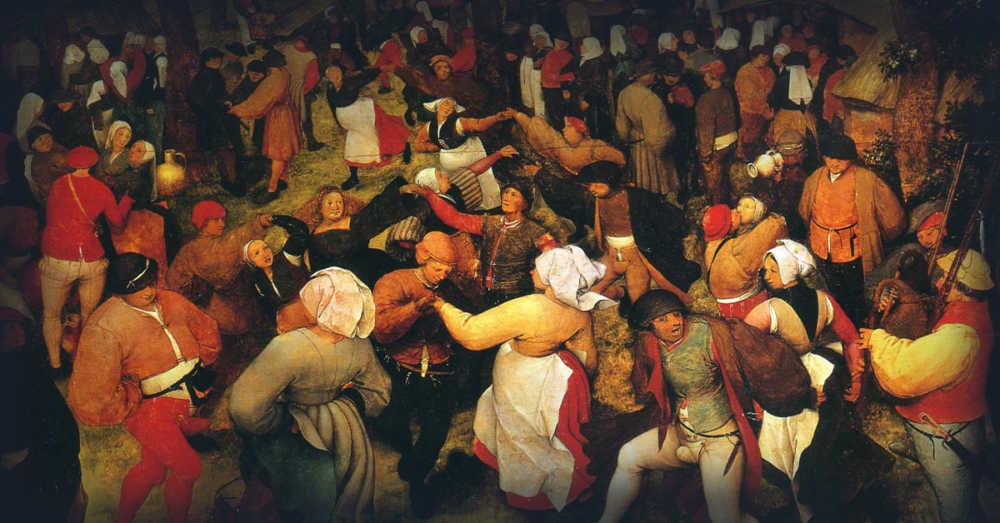We run our website the way we wished the whole internet worked: we provide high quality original content with no ads. We are funded solely by your direct support. Please consider supporting this project.

Can you have an Anabaptist Mega-Church?
Several times over the last few years I’ve heard statements like this: “Boyd may embrace an Anabaptist theology, but his church (Woodland Hills) cannot be, by definition, an Anabaptist church because an Anabaptist church can’t be a mega-church.” I’ve heard similar things about our sister church, The Meeting House, in Toronto Canada. The reasoning behind these statements seems to be that in Anabaptist theology, the church is a community of disciples who model the love of God to the world by how they love one another and share life together. Moreover, Anabaptist theology has always stressed that spiritual maturity is impossible apart from the discipline of living in community with other disciples. This is impossible to do with a group of mostly strangers who gather together to listen to a sermon and worship together once a week. Unless a group of people are doing the fifty-seven “one another’s” that are commanded in the NT (e.g. “love one another,” “submit to one another”), the group is not a “church” by the standards of Anabaptist theology (and, I would add, by the standards of the NT).
Ironically, those who argue mega-churches can’t be Anabaptist churches are assuming, in the process of raising this objection, a non-Anabaptist definition of church as a weekend gathering. If the leadership of Woodland Hills thought that our “mega” weekend gathering was “the church,” the objection would indeed be valid. But we don’t think this, precisely because this would be a very non-Anabaptist position to assume!
We rather view our “mega” weekend gathering to be nothing more than that – a weekend gathering. It’s a large event that provides us with an opportunity to teach the Gospel and to begin to make disciples by drawing weekend attenders into our much smaller house churches. The event, therefore, isn’t the church, but simply a means of building the church. In this sense, it would be more accurate to see Woodland Hills as a network of house churches that happens to have a “mega” week event than it is to see us as a mega-church.
At Woodland Hills, our house churches consist of groups of 30 or so people from the same region who gather together on a weekly basis for several hours for fellowship, worship and ministering to one another and who meet with two or three others once a week for the purpose of discipleship and accountability. Some folks in these house churches continue to attend the weekend event while others do not, and the leadership of the church is okay with this either way so long as a person’s participation in the house church and accountability groups is not compromised.
The point I’m making goes far beyond the question of whether or not a mega-church can be considered Anabaptist. Multitudes of people today are beginning to realize that the kingdom is about forming passionate disciples who live in authentic community with one another, not about attracting a large crowd to a weekly event. As people wake up to this truth, many are beginning to distain the mega-church phenomenon. In fact, I’ve heard of several pastors of mega-churches who woke up to the true nature of the church and who have consequently either resigned from their churches or who have simply shut their churches down. I for one think this unfortunate, for you’re forgoing an opportunity to influence a large group of people in the direction of the kingdom.
What Woodland Hills Church (as well as and the Meeting House in Toronto and other mega-Anabaptist Churches that may be out there) demonstrates is that we don’t have to chose between embracing the church as community, on the one hand, and holding a large weekend gathering, on the other. There’s nothing intrinsically anti-kingdom about large gatherings. After all, large crowds flocked to Jesus, and the early Christians in Jerusalem met in large groups in “Solomon’s porch” (Acts 5:16-19). The key, however, is to always remind people that the primary expression of church is not the large group, but the smaller communities that come together in houses to share life, study the word, worship and minister together.
So, I would argue that you can have a mega-Anabaptist church, but only if you continually proclaim that the church is not defined by the “mega” weekend event, but by the authentic kingdom communities you create out of this event.
__ __ __
art: “The Wedding Dance in the open air”
by: Pieter Bruegel the Elder
date: c.1566
Category: General
Tags: Anabaptists, Community, House Churches, Kingdom Living, Mega-Churches, The Meeting House, Woodland Hills Church
Topics: The Church
Related Reading

The Kingdom of God (Part 2)
The Church is called to be nothing less than “the body of Christ,” a sort of corporate extension of Jesus’ incarnate body. We are called to replicate who Jesus was by manifesting who Jesus is. And this is how we expand the dome in which God is king—the Kingdom of God. By definition, therefore, the…

Sermon Clip: Twisted Scripture-Romans 10
For many Christians, salvation has been reduced to a one-time prayer where one mentally and verbally agrees to a few key theological beliefs. The Bible and Jesus’ life, however, present us with a more holistic salvation that involves wholeness, new life, and transformation. Instead of viewing salvation as a legal contract, we are invited to…

Does the Old Testament Justify “Just War”?
Since the time of Augustine, Christians have consistently appealed to the violent strand of the Old Testament to justify waging wars when they believed their cause was “just.” (This is Augustine’s famous “just war” theory.) Two things may be said about this. First, the appeal to the OT to justify Christians fighting in “just” wars…

A Blessing for 2015
Image by Jean-Michel Guisiano via Flickr In the Kingdom, there is no waiting. There is only now. The time to be fully awake and fully alive is now. The time to abide in Christ and to live passionately in love is now. The time to live in God’s presence and let God be “all in all” is…

12 Reasons for Keeping the Kingdom of God Separate from Politics, Part 2
Image by the justified sinner via Flickr Satan is the “god of this age” (2 Cor 4:4) and “ruler of the world (Jn 12:30; 14:31) who “controls the entire world” (1 Jn 5;19) and possesses all the power of “all the kingdoms of the world” (Lk 4:6). While governments are ordained by God to preserve…

Costly Discipleship
Bob AuBuchon via Compfight Zack Hunt over at The American Jesus is doing a series of posts called “Blogmatics” in which he fleshes out the theological assumptions that inform his blog posts. A couple of days ago he discussed discipleship and the life that believers are called to in a post entitled Blogmatics: The Cost…
